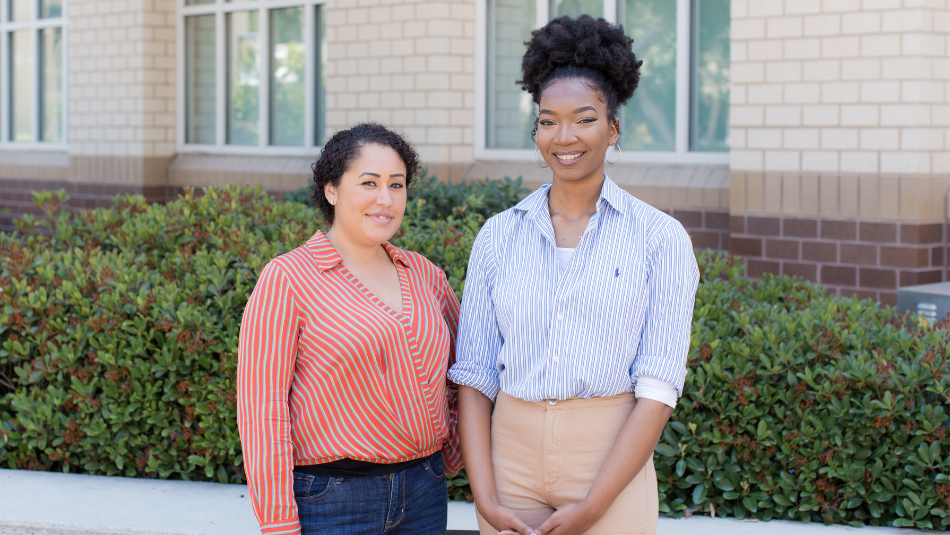
Veronica Gonzalez, left, and Kallie Brown have been named National Science Foundation Graduate Research Fellows. Photo by Patricia DeVoe
Ph.D. students named Graduate Research Fellows
As the newly named National Science Foundation Graduate Research Fellows, Kallie Brown is studying the link between positive identity and well-being of Afro-Latinos and Veronica Gonzalez is researching intimate partner violence in the Latinx community.
Research shows that having a positive identity correlates to better academic achievement, better mental health and overall well-being, and Brown’s goal is to find out how positive identity is developed.
“I want to eventually help create interventions to help teens, adolescents and young adults, especially from marginalized communities, build up their positive racial identity so they’ll have better outcomes in life,” Brown said. “Currently, I am conducting research to analyze if a positive identity is a potential buffer against discrimination’s adverse effects on stress for Afro-Latinos.”
Brown, who has a bachelor’s degree in psychology from Howard University, is pursuing her Ph.D. in psychological science. Upon completion in 2023, her plan is to join academia.
“My goal is to conduct research that will influence policy on educational and health procedures that promote a culturally inclusive environment for marginalized individuals and those with intersectional identities,” she said.
Gonzalez, who has a bachelor’s degree in psychology and social behavior and criminology from UCI, is pursuing her Ph.D. in criminology, law and society.
Her research focuses on intimate partner violence and mental illness stigma and implications to the criminal justice system within Latinx populations.
“I am currently working on several research projects,” Gonzalez said, adding that she is exploring the help-seeking behavior of undocumented immigrant Latinx survivors of intimate partner violence during today’s current political climate. She also is working on a project comparing the lethal cases of domestic violence to non-fatal felony cases. And, she’s part of a research group exploring the perception of neighborhoods of Santa Ana residents and the impact that community organizations have on those perceptions.
Like Brown, Gonzalez aims to complete her Ph.D. in 2023. “I am open to all career options but would love to work at an academic research institution, where I can mentor the next generation and help foster a welcoming environment for students from all backgrounds,” Gonzalez said.
She said she became interested in helping undocumented victims of domestic violence because the need is great, especially today as threats of deportation have increased.
“I volunteer with an organization that helps undocumented victims of domestic violence that saw numbers of clients decrease dramatically and I don’t think domestic violence went away right after the 2016 election,” Gonzalez said. “So, I want to learn more about how to do better outreach and inform the community that we in California have a sanctuary policy so that survivors know they won’t get reported to immigration officials if they seek services.”
She said she meets victims of domestic abuse who are afraid to report their partners for fear of being deported and she hopes to find ways to intervene. “Community partners, government agencies and law enforcement will be instrumental in raising awareness about our sanctuary state and what it means so that victims won’t be afraid to report their abusers.”
As part of their fellowship, Brown and Gonzalez each are receiving, among other perks, $46,000 annually to complete their doctoral degrees.